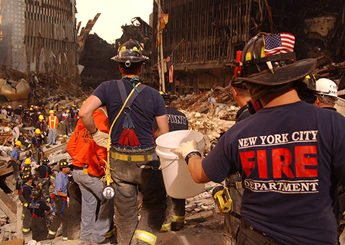9/11 responders talk about their illnesses in new report

Photo: FEMA
New York – A new report compiles accounts from 9/11 responders recalling their experiences responding to the attacks and, later, managing their World Trade Center-related health conditions.
The New York Committee for Occupational Safety and Health, in collaboration with the Icahn School of Medicine at Mount Sinai, released the report on the 14th anniversary of the 9/11 terrorist attacks.
In the aftermath of the attacks, about 400,000 people – including first responders, recovery and cleanup workers, and nearby residents and other workers – were exposed to debris contaminants that reportedly included about 70 carcinogens and other hazardous substances.
“In the years following 9/11, these responders and survivors have experienced significant illnesses related to their exposure,” the report states. “The evolution of their symptoms nearly 15 years later has proven the necessity of long-term medical care for our country’s 9/11 heroes and Lower Manhattan residents and workers.”
The report called for the reauthorization of the James L. Zadroga 9/11 Health and Compensation Act. The act provides medical monitoring and treatment for 9/11 responders, as well as area residents and workers. A bill to reauthorize the law was introduced this past spring and at press time had been referred to the House Constitution and Civil Justice Subcommittee.
The World Trade Center Health Program, established by the Zadroga Act, currently treats more than 70,000 first responders and survivors for more than 100 illnesses related to the attacks.

